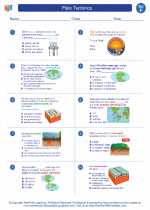Genetic Variation
Genetic variation refers to the differences in DNA sequences among individuals within a population. This variation arises through processes such as mutations, genetic recombination, and genetic drift. It is a key factor in evolution, as it provides the raw material for natural selection to act upon.
Causes of Genetic Variation
- Mutations: These are random changes in the DNA sequence that can occur during DNA replication or as a result of exposure to mutagenic agents such as radiation or certain chemicals.
- Genetic Recombination: This occurs during meiosis, the process of cell division that produces gametes (sperm and egg cells). During meiosis, homologous chromosomes exchange genetic material, leading to new combinations of alleles.
- Genetic Drift: This is the random fluctuation of allele frequencies in a population due to chance events, particularly in small populations.
- Gene Flow: This is the transfer of genetic material from one population to another, often through migration or the movement of gametes.
Significance of Genetic Variation
Genetic variation is important for the survival and adaptation of populations to changing environments. It allows for the existence of diverse traits within a species, which can be advantageous under different environmental conditions. It also plays a crucial role in the health and resilience of populations, as it provides the genetic basis for resistance to diseases and environmental stresses.
Studying Genetic Variation
To study genetic variation, scientists use a variety of techniques, including:
- Genotyping: This involves identifying the genetic variants present in individuals by analyzing their DNA sequences.
- Population Genetics: This field focuses on studying the genetic variation and evolutionary processes within and between populations.
- Comparative Genomics: This involves comparing the genomes of different species to understand the patterns of genetic variation and evolutionary relationships.
Study Guide
If you are studying genetic variation, here are some key points to focus on:
- Understand the different mechanisms that contribute to genetic variation, including mutations, genetic recombination, genetic drift, and gene flow.
- Explore the significance of genetic variation in terms of adaptation, diversity, and population health.
- Learn about the techniques and tools used to study genetic variation, such as genotyping, population genetics, and comparative genomics.
- Consider real-world examples of genetic variation and its impact on traits, diseases, and evolutionary processes.
Remember to review the processes of meiosis and genetic recombination, as these are fundamental to understanding how genetic variation arises and contributes to the diversity of life.
[Genetic Variation] Related Worksheets and Study Guides:
.◂Science Worksheets and Study Guides Sixth Grade. Plate Tectonics

 Worksheet/Answer key
Worksheet/Answer key
 Worksheet/Answer key
Worksheet/Answer key
 Vocabulary/Answer key
Vocabulary/Answer key
 Vocabulary/Answer key
Vocabulary/Answer key
 Vocabulary/Answer key
Vocabulary/Answer key
 Vocabulary/Answer key
Vocabulary/Answer key
